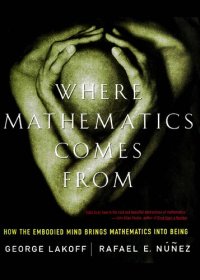
Ebook: Where Mathematics Come From: How the Embodied Mind Brings Mathematics into Being
Author: George Lakoff Rafael Núñez
- Genre: Mathematics
- Tags: embodied cognition, wheremathematics00geor
- Year: 2000
- Publisher: Basic Books
- City: New York
- Edition: 1
- Language: English
- pdf
This book is about mathematical ideas, about what mathematics means-and why. Abstract ideas, for the most part, arise via conceptual metaphor-metaphorical ideas projecting from the way we function in the everyday physical world. Where Mathematics Comes From argues that conceptual metaphor plays a central role in mathematical ideas within the cognitive unconscious-from arithmetic and algebra to sets and logic to infinity in all of its forms.
»Mathematics is seen as the epitome of precision, manifested in the use of symbols in calculation and in formal proofs. Symbols are, of course, just symbols, not ideas. The intellectual content of mathematics lies in its ideas, not in the symbols themselves. In short, the intellectual content of mathematics does not lie where the mathematical rigor can be most easily seen—namely, in the symbols. Rather, it lies in human ideas.
But mathematics by itself does not and cannot empirically study human ideas; human cognition is simply not its subject matter. It is up to cognitive science and the neurosciences to do what mathematics itself cannot do—namely, apply the science of mind to human mathematical ideas. That is the purpose of this book.
One might think that the nature of mathematical ideas is a simple and obviOus matter, that such ideas are just what mathematicians have consciously taken them to be. From that perspective, the commonplace formal symbols do as good a job as any at characterizing the nature and structure of those ideas. If that were true, nothing more would need to be said.
But those of us who study the nature of concepts within cognitive science know, from research in that field, that the study of human ideas is not so simple. Human ideas are, to a large extent, grounded in sensory-motor experience. Abstract human ideas make use of precisely formulatable cognitive mechanisms such as conceptual metaphors that import modes of reasoning from sensory-motor experience. It is always an empirical question just what human ideas are like, mathematical or not.
The central question we ask is this: How can cognitive science bring systematic scientific rigor to the realm of human mathematical ideas, which lies outside the rigor of mathematics itself? Our job is to help make precise what mathematics itself cannot—the nature of mathematical ideas.« (from the preface)
»Mathematics is seen as the epitome of precision, manifested in the use of symbols in calculation and in formal proofs. Symbols are, of course, just symbols, not ideas. The intellectual content of mathematics lies in its ideas, not in the symbols themselves. In short, the intellectual content of mathematics does not lie where the mathematical rigor can be most easily seen—namely, in the symbols. Rather, it lies in human ideas.
But mathematics by itself does not and cannot empirically study human ideas; human cognition is simply not its subject matter. It is up to cognitive science and the neurosciences to do what mathematics itself cannot do—namely, apply the science of mind to human mathematical ideas. That is the purpose of this book.
One might think that the nature of mathematical ideas is a simple and obviOus matter, that such ideas are just what mathematicians have consciously taken them to be. From that perspective, the commonplace formal symbols do as good a job as any at characterizing the nature and structure of those ideas. If that were true, nothing more would need to be said.
But those of us who study the nature of concepts within cognitive science know, from research in that field, that the study of human ideas is not so simple. Human ideas are, to a large extent, grounded in sensory-motor experience. Abstract human ideas make use of precisely formulatable cognitive mechanisms such as conceptual metaphors that import modes of reasoning from sensory-motor experience. It is always an empirical question just what human ideas are like, mathematical or not.
The central question we ask is this: How can cognitive science bring systematic scientific rigor to the realm of human mathematical ideas, which lies outside the rigor of mathematics itself? Our job is to help make precise what mathematics itself cannot—the nature of mathematical ideas.« (from the preface)
Download the book Where Mathematics Come From: How the Embodied Mind Brings Mathematics into Being for free or read online
Continue reading on any device:

Last viewed books
Related books
{related-news}
Comments (0)